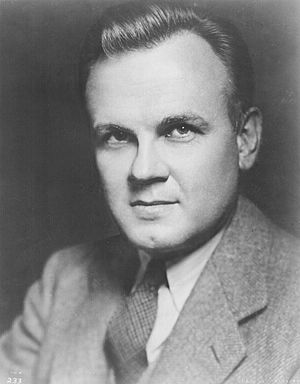Bosley Crowther facts for kids
Quick facts for kids
Bosley Crowther
|
|
|---|---|
 |
|
| Born |
Francis Bosley Crowther Jr.
July 13, 1905 Lutherville, Maryland, U.S.
|
| Died | March 7, 1981 (aged 75) Mount Kisco, New York, U.S.
|
| Occupation | Journalist, author, movie critic |
| Spouse(s) | Florence Marks (January 20, 1933 – March 7, 1981; his death) |
Bosley Crowther (July 13, 1905 – March 7, 1981) was an American journalist and author. He was a movie critic for The New York Times for 27 years. His reviews and articles helped shape the careers of actors, directors and screenwriters, though his reviews, at times, were thought of as unnecessarily mean.
Contents
Life and career
Crowther was born Francis Bosley Crowther Jr. in Lutherville, Maryland, the son of Eliza Hay (née Leisenring, 1877–1960) and Francis Bosley Crowther (1874–1950). As a child, Crowther moved to Winston-Salem, North Carolina, where he published a neighborhood newspaper, The Evening Star. His family moved to Washington, D.C., and Crowther graduated from Western High School in 1922. After two years of prep school at Woodberry Forest School, he entered Princeton University, where he majored in history. For his writing, Crowther was offered a job as a cub reporter for The New York Times at a salary of $30 per week. He declined the offer, made to him by the publisher Adolph S. Ochs, hoping to find employment on a small Southern newspaper. When the salary offered by those papers wasn't half of the Times offer, he went to New York and took the job. He was the first nightclub reporter for the Times, and in 1933 was asked by Brooks Atkinson to join the drama department. He spent five years covering the theater scene in New York, and even dabbled in writing for it.
While at the Times in those early years, Crowther met Florence Marks, a fellow employee; the couple married on January 20, 1933. They had three sons, Bosley Crowther III, an attorney; John M. Crowther, a writer and artist; and Jefferson, a banker and the father of Welles Remy Crowther.
Film criticism
Crowther was a prolific writer of film essays as a critic for The New York Times from 1940 to 1967.
His preferences in popular movies were not always predictable. He defended epics such as Ben-Hur (1959) and Cleopatra (1963), but gave the World War II film The Great Escape (also 1963) a highly unfavorable review. He called Lawrence of Arabia (1962) a "thundering camel-opera that tends to run down rather badly as it rolls on into its third hour and gets involved with sullen disillusion and political deceit."
Crowther often admired foreign-language films, especially the works of Roberto Rossellini, Vittorio De Sica, Ingmar Bergman, and Federico Fellini. However he was critical of some iconic releases as well. He found Akira Kurosawa's classic Throne of Blood (1957, but not released in the U.S. until 1961), derived from Macbeth, ludicrous, particularly its ending; and called Gojira (Godzilla) (1954) "an incredibly awful film". Crowther dismissed Alfred Hitchcock's Psycho (1960) as "a blot on an otherwise honorable career". He soon reassessed the film, considering it one of the top ten movies of the year, writing that Psycho was a "bold psychological mystery picture.... [I]t represented expert and sophisticated command of emotional development with cinematic techniques." He commented that while Satyajit Ray's Pather Panchali (1955, US: 1958) took on "a slim poetic form" the structure and tempo of it "would barely pass as a 'rough cut' with editors in Hollywood". Writing about L'Avventura (1960), Crowther said that watching the film was "like trying to follow a showing of a picture at which several reels have got lost."
The career of Bosley Crowther is discussed at length in For the Love of Movies: The Story of American Film Criticism, including his support for foreign-language cinema and his public repudiation of McCarthyism and the Blacklist. In this 2009 documentary film, contemporary critics who appreciate his work, such as A. O. Scott, appear, but also those who found his work too moralistic, such as Richard Schickel, Molly Haskell, and Andrew Sarris.
Death
Crowther died of heart failure on March 7, 1981, at Northern Westchester Hospital in Mount Kisco, New York. He was survived by his wife Florence, who died in 1984; a sister, Nancy Crowther Kappes; three sons, F. Bosley, John, and Jefferson; and four grandchildren.
See also
 In Spanish: Bosley Crowther para niños
In Spanish: Bosley Crowther para niños

